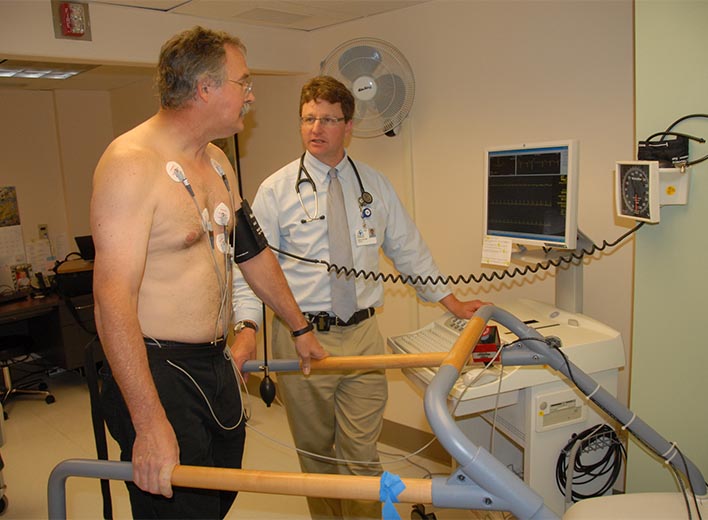Cardiology + Heart Health
Copley Hospital Cardiology provides personalized 1:1 care
![]()
We specialize in finding, treating, and preventing heart attacks, heart failure, heart rhythm disturbances, and diseases of the heart and blood vessels.
Our cardiologist works with you and your primary care physician. It is important for you to understand your illness and be an active participant in your own care.
Cardiac Services provided include:
- General Adult Cardiology
- Adult Congenital Cardiology
- Pre- and Post-Catheterization Care
- Preventative Cardiology – risk factor analysis and management
- Recovery Programs/Rehabilitation
State of the art diagnostic procedures, including:
- Electrocardiograms (ECG)
- Nuclear Cardiology & Stress Tests
Conditions treated include:
- Angina
- Atrial fibrillation
- Chest pain
- Congenital heart disease
- Congestive heart failure
- Elevated cholesterol
- Endocarditis
- Heart attack
- Heart disease
- Hypercholesterolemia (high cholesterol levels)
- Hypertension (high blood pressure)
- Pericarditis
- Valvular heart diseases
- Palpitations and other rhythm disorders

Contact Information
802.888.8344
Mon – Fri 7:30 am – 4:00 pm
Cardiac Testing: Monday – Friday
Location:
Health Center Building, 1st Floor
530 Washington Highway
Morrisville, VT 05661
Team:
Cardiac tests performed at Copley include:
![]()
Holter Monitor (Ambulatory EKG)
A small battery-powered portable device that continuously monitors and records your heart’s electrical activity (ECG) for 24 to 48 hours or longer (depending on the type of monitoring used). Holters are useful for observing occasional cardiac arrhythmias which would be difficult to identify in a shorter period of time.
Electrocardiogram (EKG or ECG)
A test that evaluates the electrical activity (rate & rhythm) of your heart over a short period of time, via electrodes that are placed on your body. The EKG tracing shows a series of waves and deflections corresponding to the depolarization and repolarization of the heart muscle with each beat.
Echocardiogram (Echo)
An ultrasound test used to evaluate the structure and function of the heart. A Technologist uses a transducer that emits high-frequency sound waves in order to create images of your heart. The sound waves reflect off cardiac tissue, returning to the transducer where they are processed into moving images of your heart, and seen in real-time on the computer screen.rt, increasing blood flow, therefore simulating exercise.
30-Day Event Monitor
A small battery-powered portable device worn for up to 30 days that you control to tape-record your heart’s electrical activity (ECG), when you have symptoms.
Stress Echo
A combination of two common tests: an Echocardiogram and Exercise Stress Test. A brief limited Echo is performed at rest. You will then exercise on the treadmill, while both a Technician and Clinician continuously monitor your EKG, and blood pressure (every couple of minutes). Once you have reached your target heart rate, you will immediately return to the stretcher to have a post-exercise Echo, which will be compared to your resting images at the conclusion of the test.
Transesophageal Echo (TEE)
A flexible tube containing a transducer is guided down your throat and into your esophagus (which sits directly behind your heart). From there, the transducer can be positioned to obtain more detailed images of your heart than a standard Echo can. Your throat will be numbed, and you’ll have medications to help you relax during a TEE.
Nuclear Stress Test (Myocardial Perfusion Imaging)
A diagnostic test used to evaluate blood flow to the heart. During the test, a small amount of radioactive tracer is injected. A special camera, called a gamma camera, detects the radiation released by the tracer to produce computer images of your heart. Images are obtained prior to and post-exercise, in order to determine blood flow to your heart during physical stress.
For those patients who cannot exercise, a pharmacologic test is performed. The patient is given a medication that dilates blood vessels leading into the heart, increasing blood flow, therefore simulating exercise.
Exercise Stress (Tolerance) Test (ETT)
A test used to provide information about how your heart responds to exertion. It involves walking on a treadmill at increasing levels of difficulty, while your EKG, heart rate, and blood pressure are monitored.
What to Expect
Copley’s Cardiologist will review your medical history and may perform a physical exam. We’ll check your blood pressure, weight, heart, lungs, and blood vessels. Some symptoms or conditions may require additional tests, such as an x-ray, blood test, or more specialized tests.
Referrals
We do not require a referral for an office consultation, but we do prefer to work in coordination with your primary care physician.
Cardiac testing requires a referral from a provider. We need the requisition prior to scheduling your testing appointment.
Copley Cardiac Rehabilitation Program
If you are recovering from a heart attack, bypass surgery, stent placement, or another heart event you could benefit from Copley’s Cardiac Rehabilitation Program.
The program can help improve your quality of life and help you reach a higher level of functioning. You’ll exercise, retrain your breathing and develop coping and support skills to better manage your condition.
